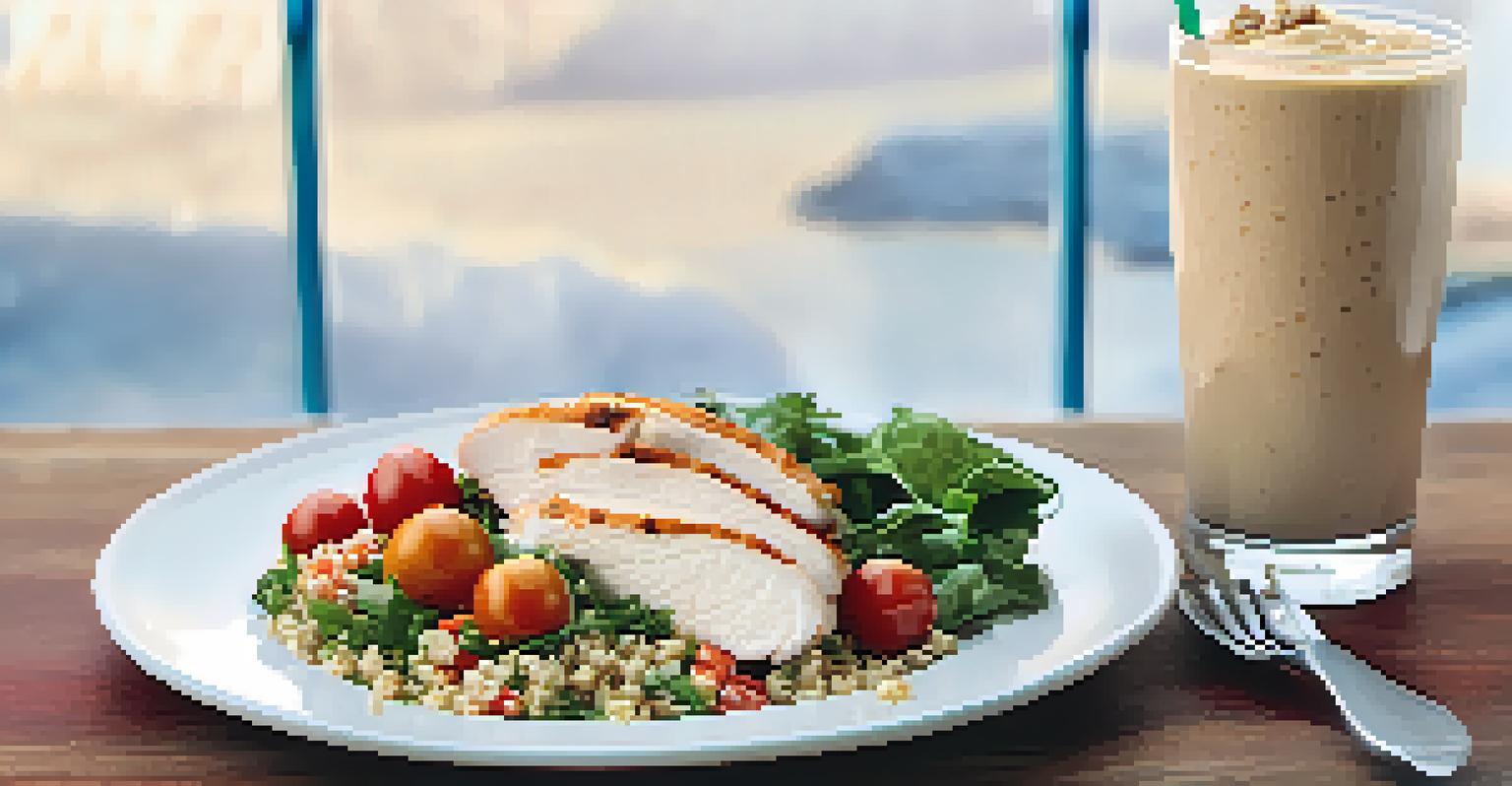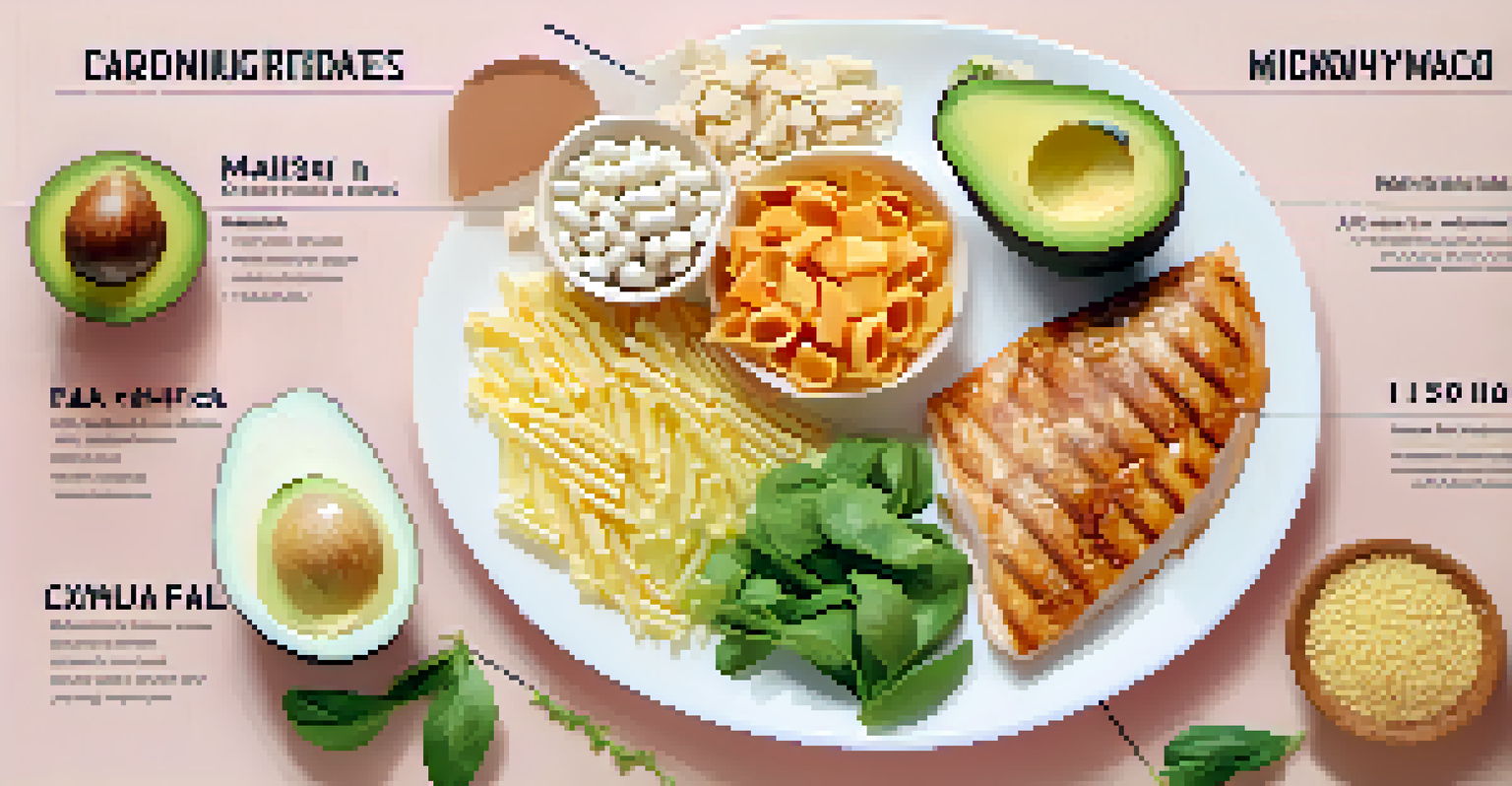Nutrient Timing: How to Optimize Meals Around Your Workouts

Understanding Nutrient Timing and Its Benefits
Nutrient timing is the strategic planning of your meals around your workouts. It focuses on when to eat to maximize your performance and recovery. By aligning your food intake with your exercise schedule, you can enhance your results significantly.
You are what you eat, so don’t be fast, cheap, easy, or fake.
For instance, consuming the right nutrients before exercising can fuel your body, while post-workout meals help in muscle recovery. This approach not only improves your energy levels but also supports muscle growth and fat loss. The right timing can make a noticeable difference in your overall fitness journey.
Think of nutrient timing like charging your phone. Just as you plug it in before needing it for a long day, you should refuel your body before and after workouts. By understanding this concept, you can ensure that your body is always ready to perform at its best.
Pre-Workout Nutrition: Fueling Your Performance
Eating the right foods before your workout is crucial for optimal performance. This meal should ideally be consumed about 30 minutes to an hour prior to exercising, and it should focus on carbohydrates and moderate protein. Carbs provide the necessary energy, while protein helps in muscle preservation during the workout.

For example, a banana with a scoop of peanut butter or a yogurt parfait with granola can serve as excellent pre-workout snacks. These options not only offer quick energy but also keep you feeling satisfied without weighing you down. Hydration is equally important, so don’t forget to drink water before hitting the gym.
Timing Your Meals Enhances Performance
Strategically planning your meals around workouts can significantly boost energy, recovery, and overall fitness results.
Visualize your workout like a race; you wouldn’t start a race on an empty tank. Proper pre-workout nutrition sets the stage for success, ensuring that you have the energy and focus to tackle your fitness goals head-on.
Post-Workout Nutrition: Recovering Wisely
After a workout, your body enters a recovery phase where it needs nutrients to rebuild and repair muscles. Consuming a meal rich in protein and carbohydrates within 30 minutes to two hours post-exercise can greatly enhance recovery. This is the window where your muscles are most receptive to nutrients.
Proper nutrition is a key to achieving your fitness goals.
For instance, a protein shake with a banana or a chicken salad with quinoa makes for an excellent recovery meal. The protein helps repair muscle fibers, while carbohydrates replenish glycogen stores. Plus, don’t forget to rehydrate; water is your best friend during this phase.
It's like watering a plant after a hot day; your body craves those nutrients to thrive. By prioritizing post-workout nutrition, you can ensure that your hard work at the gym translates into real results.
Balancing Macronutrients for Optimal Results
Understanding macronutrients—carbohydrates, proteins, and fats—is essential for nutrient timing. Each plays a vital role in fueling your body and supporting recovery. Balancing these macronutrients at different times can enhance your workout performance and overall health.
For example, carbs are essential before workouts for energy, while protein is crucial after for muscle repair. Healthy fats can be included in meals outside of your workout times, as they provide sustained energy and support hormone production. Finding the right balance can be as simple as experimenting with combinations to see what works best for you.
Hydration is Key to Recovery
Proper hydration before, during, and after exercise is crucial for optimal performance and muscle recovery.
Think of macronutrients as the components of a well-rounded meal; each has its purpose in fueling your fitness journey. By learning how to balance them effectively, you can create a personalized nutrition plan that aligns with your goals.
The Role of Hydration in Nutrient Timing
Hydration is often overlooked but is a critical component of nutrient timing. Proper fluid intake before, during, and after your workouts can significantly impact your performance and recovery. Dehydration can lead to fatigue, decreased coordination, and impaired muscle function.
It's essential to drink water consistently throughout the day, but especially around your workouts. A simple guideline is to drink 17-20 ounces of water two to three hours before exercising, and then continue to hydrate during and after. Sports drinks can also be beneficial for longer workouts to replenish electrolytes lost through sweat.
Think of hydration as oiling a machine; without it, everything can grind to a halt. By prioritizing fluid intake, you ensure that your body runs smoothly, helping you achieve your fitness aspirations.
Listening to Your Body: Personalizing Your Nutrition
Everyone's body responds differently to food and workouts, which is why personalizing your nutrition around your workouts is crucial. Pay attention to how your body feels with different foods and timing, and adjust accordingly. This individualized approach can lead to better results and a more enjoyable experience.
For instance, some people may find they perform better with a light snack before workouts, while others prefer a more substantial meal. Similarly, your post-workout meal might shift based on what your body craves at that moment. Keeping a food diary can help track what works best for you.
Personalize Your Nutrition Approach
Listening to your body's responses to food and adjusting your nutrition accordingly can lead to improved results and satisfaction.
Think of it like tuning a musical instrument; small adjustments can make a world of difference in performance. By listening to your body and being flexible with your nutrition, you can create a rhythm that supports your fitness goals.
Common Mistakes to Avoid with Nutrient Timing
Navigating nutrient timing can be tricky, and there are common pitfalls to watch out for. One major mistake is skipping meals, especially before workouts, which can lead to poor performance and increased fatigue. Another common error is not refueling properly after exercising, delaying recovery.
Additionally, relying too heavily on supplements instead of whole foods can hinder your progress. While supplements can be helpful, they should complement a balanced diet rather than replace it. Prioritizing nutrient-dense foods will provide your body with the vitamins and minerals it needs to thrive.

Think of avoiding these mistakes like steering clear of a pothole while driving; it’s all about maintaining a smooth ride toward your goals. By being aware of these common errors, you can fine-tune your approach to nutrient timing for better results.